|

The Chaplin River. Washington Co., KY.
(*photo credit) September 1, 2010 Sacred
Water: Worthy of Respect
Astoundingly,
virtually every culture regards water with the deepest respect -- whether at
times when scarce or too overly plentiful, whether when standing or flowing,
whether in the form of rain or snow. Respect emerges from our dependence on
water for life, for without it we cannot survive and with too much we can
drown. We realize this connection with water early in life. Thus we are
attracted to water and yet retain a certain fear that we cannot cope with its
uncertain quantity and quality.
For
Catholics, "holy water" is of special importance. We bless ourselves on
entering the church; we sprinkle this special water on virtually all created
things to which we give a blessing. Holy water signifies our respect for God,
the Creator of all living things. Through baptismal water we are washed clean
and thus we are reminded over and over of who we are in the Lord. The blessing
and use of holy water allows us to recall many instances of water within
salvation history: the creator's breath on the waters making them the well
spring of all holiness; the Great Flood as a sign of promise of protection; the
exodus to freedom through the Red Sea; the baptism of Christ at the Jordan
River; and the flow of blood and water from the side of Jesus on the Cross.
Water
enters into the religious action of many cultures. Muslims consider water
purification as needed before entering into the prayer area of the mosque.
Hindus give special attention to the sacred nature of the Ganges River, and many
want to be cremated on that river's banks and the ashes scattered in its moving
waters. Celts have regarded the springs of water as being special sacred
places, and later cathedrals were built on such sites (e.g., Chartres).
Primitive peoples in virtually every part of the world had sacred water places
and events as part of their ceremonial rituals and highpoints.
Respect
for water does not give it divine character but rather shows its transparency
and is a sacramental sign of the God who is near to and has become one with us.
Why not celebrate the life-giving nature of water, of which we are largely
composed? Our planet is covered with water; we recognize its essential need at
all times, for literally we must have a supply of it at hand. Water refreshes
us, washes us, cools us, and soothes us. Sight, sound, taste, smell and feeling
involve water. We may not smell distant water but some animals do.
If
we exist in an arena of water-related life, then we must respect water by
protecting sources of fresh water, purifying contaminated water, providing water
to those most in need, and finding new ways of conserving the precious water at
our disposal.
Prayer:
God, you water our lives and your spirit moved on the first vast water; make us
all the more aware of how precious this gift is for us and that it is part of
our commons.

White-footed mouse, Peromyscus leucopus, on the move.
(*photo credit)
September 2, 2010 Consider
Travel Checklists
Why
the formality of a checklist for any major event or a travel venture? The
reason is simple: the vast majority of us are forgetful when it comes to a host
of details. In fact, we probably shun people who go into too much detail about
little things because we prejudge that they never think deeply on important
issues. We might ask ourselves why we should consider a checklist after much
spring and summer travel? One answer now is that we can easily recall the items
missed and those that went unused when we traveled earlier this year. Did we
recall upon return the items we had lugged along and then never used? Did we
check upon leaving each place so we didn't leave something? Did we appreciate
the lists we did make and how often these came in handy?
A
method for constructing the checklist may help. It may be by alphabetical
order though that is challenging to construct. A more practical approach is
grouping items according to the containers to be used, namely a box for food, an
area for camping gear, a suitcase for clothes, a fanny pack for emergencies, and
a briefcase for valuables.
Services
to be performed need a listing as well: care for pets, mail or garden;
selection of electronic devices to take or turn off; bills to pay while away;
phone and other lists to carry; and people to contact before leaving; and
financial arrangements.
Emergencies
do happen and should be considered. Make a list of things that can be read or
worked on while stalled or stranded on a trip. The first consideration is that
unexpected waits are always good times to pray; they are also periods to think,
reflect, plan and sketch out future routes to travel. Make sure a writing
instrument and paper are handy. Consider all that might be packed into a fanny
pack: underwear, socks, handkerchief, small amounts of soap, shampoo and
toothpaste, toothbrush, comb, pen, notebook and other essentials such as
medicine (and passport if not worn on a chain). One friend whom I told about my
pack was stranded for a week at an airport on 9-11-01; he expressed deep regret
for not having had one with him.
Time
for constructing the list is crucial, but may be shortened by using a former
list from the files. System comes into our lives ever so gradually. A
checklist keeps down overpacking, and ought to reflect past experience of over
or sometimes underpacking. Remember that unnecessary added weight reduces the
comfort of the travel and is an energy and space waste (one pound of additional
items is one ton-mile on a two-thousand- mile trip).
Retain
the checklist for future ventures.
Prayer:
Lord, help us to confront our own forgetfulness and to prepare for it in advance
by constructing checklists, especially when we are traveling to unfamiliar
places.

Butterfly milkweed, Asclepias tuberosa.
(*photo credit)
September 3, 2010
Champion the Intellectual Commons
Here,
as a new academic year sets in, is a good time to consider the intellectual
treasury of this world and how those who advance frontiers are to be protected
and encouraged. Mental achievements are part of our common human heritage and
should be available to all and passed on easily to the next generation.
Research ought to be fostered and intellectual treasures ought to be extended to
others through a free flow of information.
Intellectual
research needs to be honored and respected. The scientific revolution
opened knowledge to critical review and verification. Copyrights and patents
provide compensation to the originators and authors and yet allow materials to
be accessible to some degree. The delicate balance between fair return for
expenses and time and adequate recognition of work on the one hand, and delivery
of the work to the general public beyond the wall of trade secrecy must be
maintained. Restrictions on access to the intellectual commons access include:
lack of access to research records, limited library use, lack of freedom of
information through trade or governmental secrecy, Internet restrictions, and
bans on specific research.
Copyright
extension is an infringement on the common intellectual stock and a
sequestering of created material from the public domain over a longer period of
time. Copyrights have expanded from fourteen years with fourteen-year renewals
in the 1790s to copyrights through the author's life plus fifty years in 1976.
Furthermore the Sonny Bono Act in 1998 extended the life of the copyright
another twenty years -- and in 2003 the Supreme Court ruled that this expanded
duration does not violate our American Constitution. Due to this act, in 2030,
the number of works in the public domain will be reduced from 25 million at the
turn of the century to 10 million.
Intellectual
transmission is another problem area because of inadequate education. Basic
education and especially reading and writing skills are denied large portions of
the general global population through lack of resources, inadequate teachers,
poor facilities or the danger for some, especially of young women attending
school. Accessibility is often the problem. Indebted nations and regions cut
educational funds in an effort to meet ends. High costs of education are
curtailing the ambitions of lower income people even in developed countries. In
developing lands such as sub-Saharan Africa, twelve million young people are
orphans due to parents dying from AIDS.
We know that educational
access to the intellectual "commons" occurs: through public and private
institutions; the transfer of appropriate technology; adequate health care
facilities; and motivation on the part of many to share resources that they
value. However, a gulf exists between the possible and actual.
Prayer: Lord, help us
to expand the intellectual commons.

Pawpaws (Asimina triloba) in Kentucky.
(*photo credit)
September 4, 2010 Halt
Overconsumption by the Affluent
Voluntary reductions in consumption
patterns by the affluent and those aspiring to be (such as the emerging Chinese
and Indian middle and upper classes) cannot be expected. It is wrong to focus
attention on free-market economics AND free choice. Those who refrain from
challenging the current dysfunctional economic system pretend to be
constructively critical by calling for voluntary changes. Hogwash! Rather, are
they not too timid to admit that their silence favors the status quo and allows
it to continue unchallenged.
A
consumer-products-subsidized public media can hardly start the critically-needed
discernment; this media knows the feeding hand and so it seeks a goal of
greater consumption of goods of all sorts. And who is best able to consume but
those wealthy enough to buy? Essential "consumption" (satisfying the hungry and
those lacking adequate housing) is NOT the problem; over-consumption by a
rapidly expanding affluent generation is -- and the world is simply not capable
of satisfying their wants. The problem is exacerbated by an insatiable appetite
for materials by those who are privileged to control resources and are free to
consume them. Unfortunately, there is a void in the political spectrum of
groups calling for MORE consumption for the disadvantaged and LESS consumption,
through regulation and taxes, for the affluent. How would lovers of comfort say
much at all? Earlier this year, a BBC commentator asked why should not BP (when
Louisiana fishers were being economically wiped out by profitable BP oil)) give
its billions of dollars in quarterly dividends to stockholders. Brokenness is
an acceptance of this type of reasoning.
The practice of
overconsumption by affluent consumers spreads globally as an epidemic,
threatening the lives of people, requiring immense amounts of resources, the
processing of which emits more and more carbon dioxide and other air and water
pollutants as well. Amid the hype, the world is expanding climate change
emissions. Despite all the green talk, for the last five years the U.S. is
leading the world in areas that have been deforested. An unchecked license for
affluence will make or break this planet, for unregulated consumer economics is
unsustainable even with the recent recession-based blip in an onward march of
consumption.
The
problem of overconsumption (from forest products to use of grain for fuels) must
be exposed especially through the relatively free portion of the Internet -- the
advertisement-bound media will not do it. We must show that alternatives for a
higher quality of life are more beneficial and that examples of balanced
consumption exist today. Warn others what overconsumption does to people,
communities and the planet herself; try to find ways to frustrate
overconsumption practices through regulation, abolition of tax havens and fair
taxes on the affluent.
Prayer:
Lord, encourage us to take up the unpopular fight of redistributing limited
resources to a world in need.

Sweet joe pye weed, Eupatoriadelphus purpureus.
(*photo credit)
September 5, 2010 Wise Use
of Possessions and Discipleship
And
scarce do we guess the things on earth, and what is within our grasp we find
with difficulty. (Wisdom 9:16)
Discipleship is truly a
calling, which some are unwilling to hear. However, Christians are called
through their baptism/ confirmation; we know that this call to faithful
discipleship can be difficult and challenging at times. Making wise decisions
in answer to the call comes in fits and starts and is seldom achieved perfectly
even at the end of our mortal life. Change is often gradual. We ignore time
required to reflect; we neglect wise advice to avoid excessive possessions; we
fail to discuss such important matters with others. The foolish person, upon
hearing he has one year to live, may if financially able, acquire a plane, a
boat, and a fast car. A wise person places his house in order with a sense of
gratitude to God for each additional day.
The shortest of the
Scriptures is the Letter to Philemon. Paul sends the slave (Onesimus)
back to Philemon as required by Roman property law, while entreating Philemon to
free the slave and return him to Paul. Onesimus had fled his master and turned
to Paul, becoming a follower of Christ and a valuable assistant requesting his
own freedom. Paul faces the slave master directly. Should not all people be
free? How could we Americans have ever considered black slaves as three-fifths
of a person? Why did it take so long to abolish the slave trade? Remember the
underground railroad, the Civil War, and the Emancipation Proclamation.
Jesus tells us that we are
to accept discipleship in a methodical manner as in building an enduring product
such as a house that was expected to last. Likewise, discipleship resembles
directing an army and the experience required to do it well (Luke 14: 25-33).
We must free ourselves from enduring and energy-draining attachments, which
would limit discipleship; we must choose the freedom of true discipleship with
Jesus. Then comes the uncomfortable statement found in Luke's Gospel:
anyone who does not renounce all his possessions cannot be my disciple.
Total discipleship involves total renunciation.
Material possessions hold us
back from Jesus. We refrain, sequester, grip, protect and covet these things in
our lives. Often we consider what gifts to give, and find that giving away what
is most dear is quite satisfying, both to the one receiving and to the one
parting with it. Our prized keepsakes, our freedom, our time, our favorite
foods, our very lives, all these can become the most worthy gifts to others.
Parting with these and letting go, opens our heart to God. We now can accept a
radical simplicity and poverty which make us able to receive the spiritual gifts
God has in store for us. And we are prepared to carry back to God our love --
the only thing that can accompany our eternal journey.
Prayer:
Lord, teach us to let go of material things and to take on the everlasting
possession of a loving heart.

Three-staff underwing (Catocala amestris). It is endangered in Illinois and Michigan.
(*photo by Sally Ramsdell)
September 6, 2010
Jobs Galore; Workers, Anxious; Funds in Havens
On
this Labor Day we again announce the tragedy facing so many of the
willing but unemployed. In order to save the precious capital of the wealthy, a
system exists where some have a means to a livelihood and others do not. "No
new taxes." That is a major form of insidious propaganda. We need fair taxes
and that means new taxes on the wealthy who pay the least. Let's not forget some
basic facts:
1. We HAVE plenty of job
opportunities though these are not presently funded:
* Bridges and roads need
repair;
* Schools and
playgrounds need expanding;
* Affordable housing is
wanted by the poor;
* Parks need
maintaining;
* Blighted areas of
cities need rebuilding;
* Illiteracy needs to be
erased;
* Elderly and the ill
need better care;
* Arts and crafts need
to be enriched and taught;
and
* Research of every kind
needs promotion.
2.
We HAVE plenty of workers:
* Over one-tenth of our
labor force under- or unemployed;
* Recent highly
qualified and energetic graduates;
* Illegal immigrants and
those good citizens vying for
permits to stay in our country;
* Veterans and those who
have sacrificed for our nation;
* Retirees wanting to
add some benefit in their Indian
summer years;
* Housewives desiring to
give extra service for others;
* Those seeking less
stressful jobs;
* Prisoners engaged in
doing community service;
and
* Youth who could learn
so much by meaningful work.
3.
We HAVE funds but also a contrary economic/political system that will not allow
us to liberate them from tax havens and the accounts of the wealthy. Three
possible scenarios are possible:
* Fair taxes at state
and national levels on excessive wealth. In our Commonwealth of Kentucky the
top one percent pay the least taxes and some defend this because they have been
thoroughly propagandized;
* International
regulations and taxes that would check the current flow of excessive capital
from one country to another
(this is being actively proposed
by a number of European Union nations); and
* Reduction in military
expenditures, and use of funds for a far more secure international program that
supports essential services for all the world's needy people.
Prayer:
Lord, allow us to stretch the limits on what can be done so the sorrowful
specter of under- or unemployment will cease.

Leaves and developing berries of the poke plant,
an edible Kentucky favorite.
(*photo credit)
September 7, 2010 A
Variety of Autumn Greens
In our part of the country,
this week is generally the last time to sow seeds in order to have a good stand
of late autumn greens. Of course there are trade-offs, for many prefer a cover
crop for the fall and winter in order to prepare the ground for spring. I
generally regard the greens that last through the winter as cover, and so pluck
early spring greens while allowing the remaining vegetative matter to be turned
under. Those of us with minimal garden space need to consider this dual factor
at work. If your intent is to plant legumes in order to enhance nitrogen
content, one alternative practice is to add diluted urine to the soil during
the seasons.
Turnips
a mainstay? If we need a single vegetable for the autumn, the humble turnip
is good, for in milder winters this can furnish food for us well into the
following spring. I was able to enjoy the produce from a neighbor's turnip
patch (he encouraged it) last winter and harvested plump and juicy turnips all
through the fall and winter (about 60 pounds) though by March they were
beginning to drying out. Fortunately a cold winter did not allow winter growth
and thus deterioration of the root bulb.
Do
you prefer variety? I like autumn greens from my earliest years when we
grew mustard, endive and kale -- and Mama would sell some of the produce at the
local vegetable market. Added to leaf crops were a wide variety of brassicas
such as collards (a standard Southern winter crop) along with broccoli, Brussels
sprouts, kohlrabi, cabbage, and cauliflower. Spinach and arugula as well as
Swiss chard are good autumn crops as are beet greens. The French enjoy autumn
endive and a variety of herbs. Celery that has been maturing through the summer
is protected by hilling. Consider Japanese Daikon radishes as a good fall
variety.
What
about your microclimate? In our more temperate climate with warmer autumns,
many crops traditionally considered spring ones (peas, onions and radishes) do
very well in autumn because hot weather that leads to seeding does not
immediately follow. If some frost protection is afforded (see permanent or
temporary cold frames, Reemay, etc.), these crops can thrive even into the next
year. Micro climate factors include the "lay of the land," proximity to rivers
or lakes with mist and fog, and gardens near to buildings and woods for wind
protection.
Do
you trade autumn produce? Many people hold off announcing fall crops for
commerce until the production has occurred. However, such trading gives other
growers the confidence that they too can grow autumn crops. Remind them that
seeds may not be stocked by stores during the summer and fall; they will have
to think ahead about fall crops.
Prayer:
Lord, help us to see the value of growing crops in the autumn and to be willing
to trust in suitable weather and the enthusiasm to tend and protect what is
grown.

Leaves of the sweetgum, Liquidambar styraciflua.
(*photo credit)
September 8, 2010
New "Fire Season" Suggestions
About
one in ten Americans (including this author) live adjacent to wilderness and
heavily wooded areas and could suffer from wildfires (see
May 1, 2007). Some of
us live in rural parts of Appalachia or other mountainous regions; others live
in suburban regions that are adjacent to wilderness containing combustibles. In
fact, almost half of Americans have acquaintances who live near wilderness. A
checklist by "Kentucky Firewise" is worth noting:
* The driveway
should accommodate fire department vehicles.
*
House address numbers (at least four inches tall) ought to be highly
visible on the house and at the entrance of the driveway.
*
Structures are to be combustion-free. This includes fire-resistant
exterior construction such as cement, plaster, stucco and concrete masonry;
cordwood walled buildings are essentially fire-resistant. Keep gutters free of
dead leaves, moss, pine needles and twigs. Enclose decks where possible.
Mobile homes should have underpinning/skirting materials to keep out combustible
materials.
* Fire-fighting
instruments are good insurance. A ladder, fire extinguisher, and hand tools
such as rakes, shovels and axes should be readily available. A hose that
reaches all the way around the house is to be readily available (a 100-foot hose
is recommended).
*
Chimneys are needed for wood-burning sources of heat but these can be
dangerous. A spark arrester should be installed on an active chimney (a
one-half-inch mesh screen is recommended). Branches are pruned back fifteen to
twenty feet from that chimney.
*
Landscaping should include fire-resistant plants, shrubs, and trees (e.g.
ash, basswood, birch, blackgum, buckeye, cherry, crabapple, dogwood, elm,
hackberry, hawthorn, hazelnut, hickory, horsechestnut, KY coffeetree, locust,
magnolia, mulberry, oak, pawpaw, peach, plum, poplar, redbud, spicebush,
sweetgum, walnut).
*
Greenspace (and veggies) may cover thirty feet of safe space around
buildings. Landscape should be kept mowed and free of thatch of any sort. No
firewood within thirty feet of the house. Note: We have recommended evergreens
as wind barriers, but these should not be closer than 30 feet from house.
*
Escape plans should be developed and discussed with family.
*
Homeowner's insurance policies have adequate coverage for the costs of
rebuilding and repairs needed in the case of a catastrophic wildfire.
*
Propane (LPG) tanks are kept at least 10 feet from a building. Keep area
free of combustible material.
Prayer:
Lord keep us safe and keep us safety-conscious.

Leaf of late summer in Kentucky.
(*photo credit)
September 9, 2010
Pluses and Minuses of Climate Change
Recent
polls show a decline in consciousness on the part of the public as to the need
to make innovations and regulations to reduce climate change. Part of this may
be a personal assessment of how much this will affect "me;" if I will not live
to see the ill affects, then why bother? I hate cold weather so bring on the
heat. It will be costly, and why should I pay for others' ill-gotten gain?
Make those who benefit the most from non-renewable energy use pay more for
damages.
Scaring
people by describing fearful results has only limited value. A more wholesome
approach would be to attempt to balance good and bad and still see the many
effects of climate change:
*
Enhanced carbon dioxide. Warmer days mean more vegetative growth. If
the warming includes higher carbon dioxide levels and humid conditions, that
growth will be good for forests. Temperate forests are known to have
experienced accelerating growth rates in recent years -- though in more arid
climates this may result in more burnout of grasslands.
*
Warmer weather. Less cold weather means reduced heating bills in
winter. This is found in certain parts, especially where increased discovery of
natural gas supplies has resulted in more plentiful fuel and lower-priced winter
fuel bills. As solar construction and solar water heating increases, we can
expect that domestic non-renewable energy heating bills will decline.
*
Northwest passage. Decline of the Arctic ice cap has been allowing for
savings in transportation energy by routing cargo across the northern trade
route in the summer months from Asia to America and Europe. As waterways stay
open well into autumn, transportation can grow in the affected areas. Of
course, the melting of the Greenland icecap will result in dramatic rises in
ocean levels and inundation of island nations as well as many heavily populated
coastal areas. And there are polar bears.
*
New agricultural prospects. Certainly areas of the world will receive
less rain and thus there will be many hurt people in those areas. However,
Russia, Siberia, and Canada are the largest and least cultivated land masses and
they await a climate that allows for grains and other crops. New methods to
reduce irrigation costs in arid regions are becoming available. However, the
future farming picture may prove quite problematic.
*
Renewable energy utilization. Climate change will hasten the transition
to solar, wind and biofuels. Thus the risk of oil drilling in deep waters,
coalmining, and unsafe nuclear power facilities and wastes will be avoided.
Prayer:
Help us Lord to have hope that even in troubled times things can get better, and
that with special care the planet could be a better place in which to live.

Ripe elderberries, ready for picking.
(*photo by Sally Ramsdell)
September 10, 2010
Elderberry: The Modest Berry
Strawberries
in May, raspberries in June, blackberries in July, blueberries in August, and
even cranberries in November; what about September and October? Let's at least
consider elderberries though more modest in fresh taste than the others. In
fact, one might be tempted to say that elderberries are too modest to consider.
I would have agreed until the first time I tasted the luscious elderberry
cobbler made by some Dominican Sisters in northern Ohio. That moved me to
celebrate elderberries in all their many culinary creative forms -- for they
lack much when eaten right off the cluster or in appearance when ripe.
Good
gathering. Among the advantages of elderberries is that, unlike
blackberries with briars and strawberries growing close to the ground (aching
backs), elderberries are thornless and their clusters are all concentrated in
clumps; they also grow mercifully high up on the stalk. Elderberries invite
being gathered. They do not require cultivation, since they grow profusely
along creekbeds and ponds and near wet areas and at roadsides; they are there
for the taking.
Good
cooking. The surest benefit of the comely elderberry is that it springs to
life when baked. Elderberries are found in pies made from various recipes, as
well as the mentioned fabled cobblers: one cup each of berries, water, and sugar
with several tablespoons of clear gel dissolved in water and all cooked together
and poured into your favorite pan crust and baked for 35 minutes at 350
degrees. This size of baked cobbler makes enough for eight people). Cooks also
incorporate elderberries into muffins, pancakes, cookies, jellies and jams --
and the bakers can easily avoid cholesterol in baking with elderberries. Most
notably, elderberries make a wine used more for health effects than for taste.
Native Americans put elderberries into teas and tonics.
Good
for Health? Last month (August 18th) we reflected on blueberries and noted
that research shows multiple health effects. Then comes elderberry wine with its
litany of cures for flu and colds of every sort along with sore throats, coughs
and even constipation and the berry's flowers for healing burns. Furthermore,
there are the anti-oxidant properties and the immunity and fortification
properties with caveats that this is not medical advice. For sure, green
berries are toxic.
As
the elderberry season is coming on, let's resolve to try the rather
bland-tasting berries in some prepared fashion and not turn from them because we
do not like the fresh berry taste or looks. There is much in store if we are
willing to spend some time in baking or wine-making with the humble but
surprising elderberry.
Prayer:
Help us, Lord, not to judge the gifts of creation at first sight, but rather to
put human effort into making them the wonderful gifts that they really are.
Extend this to all of your creation, seeing the human touch adding value to the
gift itself.

Peering through the cattails.
(*photo credit)
September 11, 2010
Environmental Lessons from the Oil Disaster
Ruined
marshlands, oil-soaked birds, contaminated beaches and shellfish beds all give a
sorry picture of one deep oil-well explosion in April, 2010. On Federal
Lands Cleanup Day we wonder whether anything good can come from such a
disaster? Perhaps we do learn from such costly accidents:
*
Non-renewables (whether oil, gas, coal or nuclear energy) are risky.
Human workers, nearby residents, or the environment itself have suffered
severely through exploitation of non-renewable energy resources. The bigger the
development, the better the chances that disasters may occur. If those
benefiting from the profits were made to bear the full cost of disasters, such
energy would cost so much that consumers would hesitate to pay for it.
*
Lack of honesty. A month before the Deepwater Horizon accident in
the Gulf of Mexico and the resulting gusher a Newsweek advertisement by
Chevron panned the concerns of environmentalists and in a bravado manner
concluded with "Drill, baby drill." The ink of that ad was hardly dry when the
effects of unprotected drilling became evident, with no company able to
forestall what was regarded as a very slight chance of accident. Slick ads can
be grossly misleading and consumers are easily misled.
*
Lack of protective technology. Don't interpret the ability to exploit as
being equal to the ability to protect the environment or nearby people. In
fact, the history of western exploitation is replete with disastrous examples of
subjugation of people and destruction of resources. A healthy skepticism about
what is meant by technological "advancement" may be coming forth from this
terrible disaster. Deep drilling is being perfected as a means of tapping the
vast reserves of deep ocean petroleum, namely the Gulf, the Arctic regions, and
off the coast of Brazil and Southeast Asia. Let's consider going slow on such
last-frontier exploitation lest another catastrophe occurs.
*
Lack of enforcement. Don't buy the regulatory enforcement assurances,
when they come from a bunch of the oil-exploiting crowd who people the
regulatory agency. The contamination of the enforcement agencies only came to
light after the disaster, but it is most telling that without oversight all
think things are going fine -- until something goes wrong and we find out the
truth.
*
No magic cleanup. In our fiction-laden era we expect that all things can
be made right by those who are to blame or who have the responsibility for
governmental oversight. Unfortunately lack of policy, protective technology,
and enforcement make cleanup by someone or many a distant wish. Not all
disasters are easily cleaned up, and the mess in the Gulf is a prime example of
the limits pushed by a greedy consumer culture seeking cheap oil.
Prayer:
Lord, that we might learn to respect our fragile planet and live within the
bounds of our abilities.

Polygonia comma, resting in a patch of vegetation.
(*photo credit)
September 12, 2010
Prodigal Son and Forgiving Father
The Prodigal Son Parable
(Luke, Chapter 15) is grouped with the parables of the lost sheep and the lost
coin. Care is needed in the regaining of each lost animal or person. God is a
caring shepherd when going to find the one lost sheep and rejoicing with the
court of heaven over its return. Often we too need to seek and to reach out
freely and rejoice when bringing back others to proper living. So, too, God is
a diligent housekeeper (a female figure) when searching the house for the lost
treasure. God is always caring for us.
Forgiveness is at the heart
of the parable of the Prodigal Son -- or Forgiving Father -- or Unforgiving
Brother. Where do I fit into the picture? We all are partly Prodigal Son, for
we are wayward in our actions and practices, not being perfect people. Time
flies, and we find that we have allowed our life to pass before us in a wink.
We suddenly come to our senses. In some way, all of us are prodigal children of
our Father in heaven.
There
is also the element within us that does not want to forgive others, especially
those who have such clear faults that all are aware of them in many ways. Why
forgive, when the other sibling caused the brother harm in squandering half of
the possessions? We may see close relatives or friends lose precious
opportunities and find it hard to forgive them, especially after they hurt us in
some way.
Perhaps
the father figure in the Parable is difficult to imitate because it is so hard
to be godly, and forgiveness is to imitate God in our way of treating others.
If we do not forgive, we can hardly be forgiven, and so forgiveness is a prime
mandate of those committed to the road to perfection. The forgiving father
looks out each day and finally spots the son from a long way off. He has so
longed for the son's return. Recall that the prodigal son has memorized a
verse, but the father does not allow him to complete it because forgiveness has
already come before the son speaks. God's mercy is always at work from the
first moment.
Often we are tempted to
favor the unforgiving brother. The father cannot dissuade him from his own
festering anger. The brother does not feel like celebrating, especially after
all the hard work he has expended. Why all the toil, if the other son is
forgiven for doing wrong things? But the unforgiving one fails in generosity
and in sharing in celebration with his grieving father.
However, God gives all to us and
none of us is worthy -- not just the prodigal ones. To fail to forgive is to
fail to love, and thus the isolated retreat back into self-pity. It's
frightening.
Prayer:
Lord, help us to be free agents who bring back to life all in need of
forgiveness. Help us reflect on the phrase, "He who is as good as dead has come
back to life." Help us to forgive, to give new life, and to reestablish loving
relationships and new bonds of love. Help our neighbors to do the same.
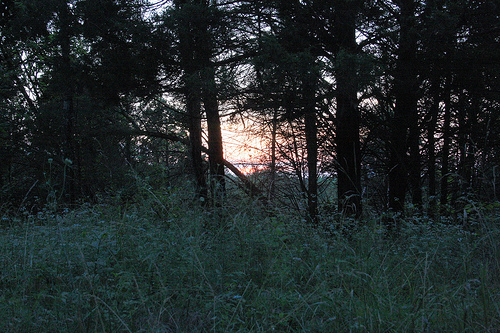
The setting sun meets land.
(*photo credit)
September 13, 2010
Alsatian: An Endangered Language
When
implements we used in youth are now found in museums (e.g., corn shellers and
scythes), we know we are aging; when the language used by our grandparents --
and father in youth -- is endangered, we feel even a little older. Alsatian
(still spoken by folks in Alsace in northeastern France) is so designated as
endangered. It is a dialect of High German (Elsassisch) and known as
Alemannic in scientific circles (German spiced with French). Actually there are
several varieties of that dialect spoken in parts of the region by a diminishing
number of residents. My second cousin's children and grandchildren speak
French, but her own language of village communication is Alsatian.
During
the early part of the Second World War our relatives were evacuated to central
France, in the largest such movement in French history; however they tell us
that once they arrived residents called them "Borsche" though they were French
citizens. In such an atmosphere they clustered together; after the surrender of
the French government in June, 1940, they were able to return to their homes.
Back now in occupied territory, they had to purge themselves of any French
habit, even the wearing of the beret. After the war, which had taken such a
tragic toll on that neighborhood, everything became French again. However,
today the border between the two countries (France and Germany) has been erased,
and you hardly know you cross from one to the other.
Dialects
have a hard time even when Alsatian wines are well known. One sees few Alsatian
signs, no major newspapers, and no notation on gravestones in Alsatian.
However, famous Alsatian dishes such as Flammenkuche, tarte flambee and
Grande Choucroute are available. Youth learn French in schools and
reserve the dialect for conversation with family elders. The patterned road to
extinction is laid in Internet interaction, university life and coffee shop
conversations; this is similar to what is happening in Pacific Isles, among
Native Americans, and in many parts of Africa. Europe is not immune from the
half of 6,000 world languages being lost in this century -- and my grandparents'
tongue is one of them.
Why
not save the treasure of the past by teaching the language in schools, replacing
road and street signs with signs in dual-languages, and taking festive and
official pride in what went before? The language has a rich medieval literary
legacy and deserves to be in school curricula. Some languages such as Basque
fight back as best they can; others such as Bo have died with the passing of
the lone survivor (See May 29, 2010). Conservationists who do not want to see
plants and animals extinguished must give attention to world's languages -- and
dialects. Cultural treasures can be lost. Some educational resources should be
given to preserving and cultivating the minor tongues for preserving the
untranslatable richness of our global culture.
Prayer:
Lord, help us to see what we have inherited and to expend some effort in
preserving these cultural treasures.

Forest floor color in September.
(*photo credit)
September 14, 2010
Gratitude for September Gifts
As
the weather becomes a little milder and the autumn is approaching, those who
suffered through a hot summer are beginning to discover new subjects to be
thankful for:
*
Living through the summer and coming out with a pleasant disposition and good
memories of the preceding three months;
*
Fruits and vegetables of summer in all their richness, including peaches, corn,
beans, plums, berries, okra, new potatoes, beets, carrots, tomatoes in all
sizes, squash, and cucumbers together with the first autumn apples during this
month;
*
Cool mornings and the heavy dew and occasional heavy mist in the valleys;
*
Gatherings of people in our worshipping communities and the concern these have
for the ill and abandoned folks especially as winter approaches;
*
Festive occasions in the fairs and festivals of late summer and autumn and the
desire of people to socialize together in more light-hearted ways;
*
Those with special musical and artistic talents who have inspired us and go
somewhat unnoticed;
* Parents and forebears who
have gone on before us and yet who have inspired us by their concern for us and
others;
*
Conserving folks who want to continue the good of the past and to conserve
resources of every sort (finances, energy, soil, and human good will);
*
Soybean and corn fields now turning golden and the hopes that the products will
be used only for the benefit of all people;
* Academic institutions and
the teachers who show such enthusiasm and desire for the transmission of
knowledge to a new generation of eager learners;
*
Libraries and receptacles of knowledge of every form including the Internet,
with the hope that the means of preservation will be sufficient to allow
knowledge to be transferred with ease to future generations; and
*
Fall rains that are so needed to assist the frail autumn plantings and the cover
crops sown for winter protection.
Prayer:
Thank God for September from all of us who are September-born.

Ironweed (Vernonia altissima) with lovely visitor.
(*photo by Sally Ramsdell)
September 15, 2010 The
Spirituality of a Non-Royalist
I inherited from my
ancestry a religious piety but not a royalist one -- from some but not all.
However, when looking closely at homilies, prayers and other devotions I find a
politically partisan flavor to some of the church activities down through the
ages. We are quick to call Christ the "King" and Mary the "Queen" of heaven.
This is acceptable for I prefer transferring nobility away from blood lineage
and privileged but highly imperfect families.
However,
in an effort to instill patriotism and a mix of culturally-bound religious
practice we find that numerous kings and queens accepted by Catholic, Orthodox
or the Lutheran faiths are regarded as saints (Boris of Bulgaria, Cunegund,
Edward, Eric of Sweden, Elizabeth of Portugal, Ethelbert, Hedwig of Poland,
Helen (Ellen), Emperor Henry II, Louis IX of France, Margaret of Scotland, Olaf
of Norway, Olga, Stephen of Hungary, Vladimir of Kiev, Wenceslaus, etc.). Some
like Olaf were so cruel in methods that, if they made sainthood, just about
anyone can make it. It disturbed me that monarchs stood out from the
rank-and-file individuals whom we could elect for fixed terms in office and who
are accountable through democratic mechanisms. Kings killed and queens were
arrogant -- and yet they are remembered when the saintly are often forgotten.
Far
better is it to look upon the heavenly body as comprising many who were not
well-known and yet were faithful to their callings and influenced those in their
immediate surroundings. Those of us who are non-royalist like to find in Jesus,
descendant of David the king, a person who never flaunted earthly royalty. Jesus
told Pilate that he was a king, but that his kingdom was not of this world. We
prefer to see kingship where the leader goes before us and does not so much sit
above us. Jesus shows kingship by washing the feet of his disciples and
expected them to do the same. Humble service as kingly is often forgotten.
Subjugating Earth in an exploitative manner neglects a loving service of "power"
and "lordship" that even environmentalists forget is the Christian way of
acting.
Our
kingly service ought not to be in palaces but in the hovels and slums of cities
and the backwoods of our rural areas. Here we can still serve as leaders and
change agents, but without the pomp and fanfare accorded nobility. Doesn't this
have a deeper scriptural basis, especially since God did not want the chosen
people to be ruled by a King, and God yielded to their insistence to be like
their neighbors? Nobility based on blood lines was not highly regarded in
Scripture, just as our profit-motivation ought to be spiritually and not
materially motivated.
Prayer:
Lord, teach us to be direct in our prayers, to use words more in keeping with
direct discourse today, and not to be subject to kowtowing. Help us rid our
prayers of noble privilege and become more democratic in their manner of
expression.
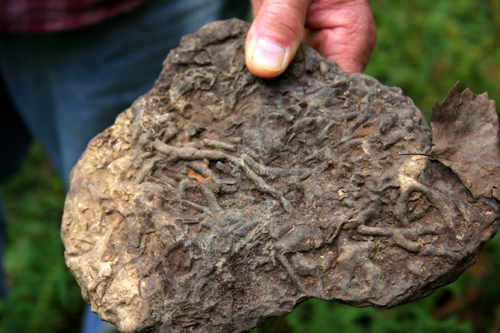
An assortment of bryozoan fossils.
(*photo credit)
September 16, 2010 Five
Innovative Ideas for Citizenship Day
Tomorrow
is Citizenship Day when we generally review our efforts at being good
citizens such as voting and being involved in local or national political
issues. Opportunity to express ourselves exists in this election year. But
citizenship involves more and has a social, economic, cultural, and human-caring
flavor.
*
Youth Initiatives. "Are You Ready" "To Take It Back?" These two signs
have been posted all over our community by school kids who got the idea, the
funds for making signs, and then the enthusiasm to spread these throughout the
county. The message refers to taking back the schools from the drug culture.
The initiative is from students with the sincere encouragement of parents and
all in the community. The youth took the problem to the public arena where
citizenship is rooted. Take back the schools!
*
Farmers' Markets. We have had a proliferation of small- scale
initiatives to sell home-grown items that have blossomed in the area along with
yard sales. Actually, such sales keep money within the community; otherwise
customers will patronize the national chain stores that drain community
resources by selling low-cost and short-lived, foreign-made products -- and
distantly-grown food items laced with chemicals. Take back the marketplace!
*
Backyard Gardening. Produce, and don't just buy food from a good place.
Spare land may exist on which to garden, and most people could have at least a
pot of herbs or tomatoes during the growing year and beyond. Take over the food
sources!
*
Historic Highlights. Every place has a history and it ought to be one of
which we are proud. Kentucky and other states place markers at selected
historic sites with proper explanations. Why not more of them? Residents will
develop a deeper pride when they become familiar with local history and are able
to tell it to others. Take in local history!
*
Employment Opportunities. All parts of our country are in need of
community infrastructure improvement and repair. Allowing other places to
receive the attention sounds nice and deferential but overlooks the fact that
every part of our country has such needs. Our military budget needs trimming
and the funds need to be returned to communities for a host of public
accommodations (bridges, clinics, schools, housing, streets, parks, rest
facilities, lighting, etc.). Take up "the right to work"!
*
Visitations. We are all one community but all too often people are
forgotten. Moving about the community and discovering who the ill are takes an
extra effort. How often, after an initial alert, the sick recede into the mists
of our busy world. Take on the works of mercy!
Prayer:
Lord, help us to be alert to our responsibilities.

Decomposition with beauty.
(*photo credit)
September 17, 2010 Yom
Kippur: The Perpetual Call for Inclusivity
This evening begins the
Jewish High Holidays or Day of Atonement, a fast day observed on the 10th day of
Tishri. The day is referred to in Leviticus 16:29-34.
This shall be a
perpetual law for you. On the tenth day of the seventh month you must fast and
refrain from work, the native and the stranger who lives among you. For this is
the day on which the rite of atonement shall be performed over you, to purify
you. Before Yahweh you will be clean of all your sins. It shall be a sabbath
rest for you and you are to fast. This is a perpetual law.
Even if we non-Jews do not
observe this day, we should honor those who do and discover the spiritual value
they find here. All of us ought to see the need to take time and purify
ourselves, to fast and to resolve to start life anew. That is a form of moral
support. We pray with them that atonement already begun will move to completion
with all of us also working for at-one-ment, a coming together in communion with
the Lord and with our fellow human beings through removing personal barriers
that separate us.
Honoring this day is a good
way to improve relations with the Jewish community and to partner with that
group in what they are solemnly called to do and be. Especially since the
twentieth century "Holocaust," all people must purge themselves of anti-semitism,
and beg God's pardon for the offenses committed in the past against others in
the name of religion. But that is not enough. Healing that we seek for this
Earth must take on a profound sense of humility at what has transpired in the
last century and what stands to be accomplished in years to come.
While
saying this, we need to be clear. Not every policy of Israel, the Jewish state,
ought to be left unchallenged, especially the blockade of the Gaza Strip and the
use of force this year against those activists who seek to break that blockade.
A sincere tolerance does not mean we must be silent at all times; it is far
better to be up-front about activities we do not condone. We are all one
family and so we engage in a challenging interchange.
Yom Kippur becomes a more
universal day when we universalize the need for purification; and healing of our
Earth requires internal purification. This event helps us to see past failings
towards our Jewish brothers and sisters, but pointing fingers is no solution.
We bear a social responsibility, and so Yom Kippur can become for all of us an
interfaith activity. In so doing, we all, Jew and non-Jew alike, can hear God's
call that we must all be one -- and that the Jewish people have a perpetual role
to play in bringing this about, namely, universal inclusivity of our God and of
our human mission.
Prayer:
Lord, help us all to find time to fast and make atonement for things done wrong
in the past by our community. Help us to assist our Jewish friends to
forego exclusivity and to lead this needy world in the quest for oneness through
atonement.

Late afternoon stroll by water's edge. Mercer Co., KY.
(*photo credit)
September 18, 2010 World
Water Monitoring Day: Urgent Times
With
each passing year the water resources of the world become a topic of greater
urgency due to increased population and need for fresh water, shrinking water
aquifers, and melting fresh water ice reserves in polar and glacier regions. We
have much water but a limited supply of accessible fresh water, for 97.5% of the
Earth's water that covers four-fifths of the planet's surface is too salty to
drink. Of that 2.5% that is fresh water, some 69.5% is tied up in ice caps,
glaciers and permafrost, 30.1% is in groundwater and 0.4% is in surface and
atmospheric water.
Of
this last 0.4%, some 67.4% is in lakes, 12.2% in soil moisture, 9.5% in the
atmosphere, 8.5% in wetlands, 1.6% in rivers and 0.8% in vegetation. This
"usable" water is a critically small portion of the planet's total
self-contained, limited water supply -- and thus we need to institute ways of
preserving this precious and limited fresh water resource by conservation
measures.
Agricultural
water use (67% of total fresh water) can be greatly reduced by better irrigation
and water transport (lined water conduits) and ultimate utilization (e.g., drip
irrigation and use of mulch). Many of the heavier industrial and domestic users
(20%) and power generators (10%) are taking conservation steps in production of
goods and electricity. While domestic water conservation measures are important
in times of water scarcity, we all ought to become conservation-conscious and
engage in water saving practices (e.g., shorter showers and low-flow faucets).
Available
instruments allow us to measure water waste in various areas of the "water
consumption" process (not available for reuse). Greater rates or fines can be
imposed for water waste once use is monitored. Evaporation from fresh water
sources can be reduced by the use of evapotranspiration computer techniques;
leaking pipes and storage containers can be detected and fixed; dripping faucets
are able to be repaired; the watering of plants can be done during cooler
periods of the day; and lawns can be planted in arid-types of vegetation or
golf courses by vegetation that thrives on saline water sources. Many
innovative ideas that allow for conservation of water supplies exist. These
must be publicized.
Monitoring
will be necessary in the future when rising urban populations reach water
crises. Such water-short, mega-metropolitan areas as New Delhi and Mexico City
already strain to redistribute limited water to the very needy. Limited amounts
of available fresh water are at stake. Desalination of plentiful lower quality
water (see September 21st) is possible, but distilling salt water, as performed
in oil-rich and water-poor Persian emirates, is grossly expensive. Low-priced
solar desalination methods await future technical breakthroughs.
Prayer:
Lord, teach us that the human right to water can be aided by supporting strict
monitoring of current water users.

Turtlehead, Chelone glabra.
(*photo by Sally Ramsdell)
September 19, 2010
Resourcefulness and Stewardship
No servant can serve
two masters. (Luke 16:13)
As we prepare to vote in
November, it is important to set the priorities we expect of a candidate. Are
candidates able to serve and use their own resources and talents? Do they
understand the limited condition of physical resources available in our country,
state or local community? Do they understand that one serves God in fulfilling
civic duties and these duties have social, political and economic consequences?
In the eighth chapter of
Amos the Prophet, we are reminded that we are not to trample upon the needy.
But trampling is so often done by those with heavy military or exploiter boots
or those with hiking or lobbying shoes. We can make heavy footprints as
individuals or as groups. We tend to take advantage of the poor when we buy
materials made in sweat shops overseas, when we allow industries to move abroad,
to escape responsibilities to long-time, loyal workers; and when we minimize the
services of the minimum-wage earners. What about egregious examples, e.g., the
deporting of hard-working illegal workers; the Chinese day laborers without a
written contract who work a month and are dismissed without pay; the Native
American groups who lose priceless sacred objects to grave and artifact
stealers; and the people who live downstream from unsafe coal slurry
impoundments?
In
St. Luke's Gospel we are told we must be as resourceful as those who are the
clever but evil-spirited stewards of the Earth's resources. You mean bad guys
have good qualities worth imitating? In this vivid parable Jesus says the
answer is "yes." We can learn from resourceful profiteers. Good stewardship
must have such basic ingredients as realizing that our gifts are from God, and
we have only a short time to use them properly. These characteristics help make
us all the more resourceful. Those who have yard sales for recycling clothes
and domestic items know how to use resources well; those who teach youth or care
for the sick learn how to keep people interested and cheerful; those who have
little, know how to squeak by on less and share with the still more needy.
We realize that our
God-given gifts are ours for only a brief period. Do we recognize these for
what they are, and learn from resourceful people how to use gifts in ingenious
ways? Should not each of us find ways to convert from fossil fuel to a
renewable energy economy -- and support those who champion such a process? Are
we constantly on the lookout for new ways to get our message across to those
with whom we have contact? Do we take time to evaluate how well we as
individuals and as communities use our God-given gifts? Do we see our works as
prayers, and offer them each day to God as part of our resourceful use of time?
Prayer:
Lord, help us to become ever more resourceful and to learn from others who do
such things well.

Autumn sneezeweed (Helenium autumnale).
(*photo credit)
September 20, 2010 Call
for a Nuclear-Free Middle East
We
hear much about the Middle East because the key to world peace is focused
there. The festering Palestine problem seems to have no solution; Iran captures
the news on an almost-daily basis; we have been engaged in and are only partly
disengaged from two wars in Iraq and Afghanistan. Syria and other Arab nations
have called for a nuclear-free Middle East region (just as there are
declarations of a nuclear-free Africa and nuclear-free Latin America).
Certainly we all want a nuclear-free world and must work to achieve it
region-by-region until all nuclear weapons have been eliminated.
Since
at least 1968 a nuclear-free world has been a long-term goal, especially through
the Nuclear Nonproliferation Treaty (NPT), which limits weapons to Russia,
United States, United Kingdom, France and China. However, other nations such as
India and Pakistan have obtained weapons without accepting the treaty.
Furthermore, Israel has such weapons but is not an NPT member and refuses to
participate. Recently North Korea withdrew.
With
respect to Middle East policy it is hypocritical to focus attention solely on
Iran, which says it is acquiring enriched uranium for its peacetime programs
(despite the long-term risks of nuclear powerplants). The unspoken discussion
point in the Middle East is the supposed hidden atomic arsenal of Israel.
International concern must work two ways, not all directed against Iran alone.
Why has the United States, a broker of Middle East peace efforts, refused to
address this most hidden and most known of secrets, namely that one nation of
that region already has such weapons? Unless this problem is faced, there's no
lasting peace.
The
Obama Administration seeks to talk about a comprehensive Middle East peace
initiative that includes lifting the Gaza blockade and stopping the expansion of
Jewish settlements in the West Bank areas. Nuclear weapons retention is well
worth including as one of the essential issues for, unless it is raised, certain
other Middle East nations will strive to counterbalance the superiority of
Israel in the region.
Yes,
let's make a nuclear-free Middle East a goal for peace and require inspections
and verification of the weapons of ALL nations and not just those of the NPT
members. Amazingly, this even-handed approach would go a long way to bringing
about a peace settlement that has been so long postponed, delayed and reneged
upon. The United Nations ought to be the guarantor of the security of that
region, not one or other nation state arming itself in a "never again" attitude
that is only making the world more insecure. The presence of nuclear weapons
only makes the Middle East a volatile place to live. Come clean, Iran! Come
clean, Israel! How else can our Earth be healed?
Prayer:
Lord, help us have the courage to require international honesty and transparency
as a step to world peace.

Patch of green in murky Kentucky stream.
(*photo credit)
September 21, 2010
Desalination: A Technological Frontier
Increased
world population, rapid urbanization in developing regions, growth of the global
slum population to nearly one billion in a decade, and limited and costly water
supplies make affordable and available clean water a major problem area. If
97.5% of the planet's water is undrinkable, could not the free solar energy be
used to desalinate saltwater -- a great technical frontier?
An estimated 300 million people
get their water from sea or brackish groundwater treatment methods today, double
the amount of water in one decade -- and an additional 13 billion gallons per
day are expected in the next six years through new desalination projects. No
doubt, conversion of undrinkable to drinkable water is the 21st-century
water/heat transfer engineering undertaking.
Distilling
water using conventional energy sources is costly even though it is used in
small projects and in water-short, petroleum-rich Middle East countries to
enhance water supplies. This longstanding practice is environmentally and
economically wasteful, and the distilling residue (salt) remains as a disposal
problem. When inlets and bays furnish the water for desalination, over time the
residue of the operation will make surrounding water, such as shallow portions
of the Persian Gulf, saltier; and so purification costs will creep up.
Reverse Osmosis (used in Tampa, Florida, and Perth, Australia) is expensive,
but less so than distillation; the process involves applying pressure (one
thousand pounds per square inch) that leaves salt behind in transferring water
through special membranes. Forward Osmosis sends water through a porous
membrane into a more salty solution wherein the special salt is more easily
removed than common sodium chloride. Other newer techniques include Carbon
Nanotubes that repel positively charged sodium ions and allow water to pass
through the tubes. A Biometrics approach allows water to pass through a
protein channel similar to what happens in the human body; the salty brine
remains. All of these methods are costly on a major scale, and residues remain
for disposal.
Solar distillation
awaits new breakthroughs, but many realize the potential for application in a
thirsty-but-poor world. One solar desalination technique is the
multiple-effect humidification that is similar to the natural water
recycling process except at a more rapid rate. Solar heat vaporizes liquid
water that is then condensed and the heat given off can be used to preheat the
incoming salty water. Small-scale operations are possible because the heat
given off is regarded as "waste heat." In larger operations, the unsolved
challenge is the cost of achieving optimum temperature difference between the
solar-caused vaporization and the seawater-cooled condenser. As some of these
heat transfer problems are solved economically, one can expect solar stills to
be considered by water-short urban areas, especially where available brackish
water sources exist nearby.
Prayer:
God, give us the courage and ingenuity to tackle the water shortages that are
besetting our limited world.
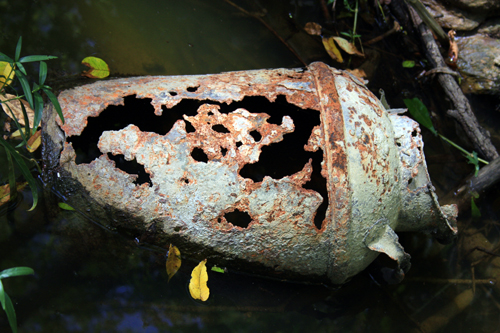
Rusty milk jug in Anderson Co., Kentucky creek.
(*photo credit)
September 22, 2010 Global
Sanitation Problems and Solutions
The
lead article by Juliette Jowit in The Guardian Weekly (May 6, 2010)
states that the UN Millennium Development Goal (to halve the number of people
not having clean drinking water and adequate sanitation) is not being reached.
The UN says that 1.3 billion people gained access to water and a half billion
have better sanitation. Independent development expert Asit Biswas says this is
"baloney" and the problem is worsening -- not improving. Biswas says the number
of people suffering from lack of proper sanitation and drinking water is
increasing due to poor management of resources. Some in the UN estimate that
only 42% of funds allocated for sanitation and safe drinking water are reaching
the problem area. Throwing a little concrete around a waterwell does not
improve water quality -- though called an "improvement."
Severe
water quantity and quality problems face the congested mega-urban centers in
Asia, Africa and Latin America swollen with millions of people from rural
areas. When waste materials accruing from these increasing populations are
removed by sewage systems through flushing with scarce water, the upkeep of dual
(water/sewage) systems is problematic. The nations are short enough of funds,
with competing demands for security, rapid transportation, safe food, adequate
housing and employment. Amazingly, in the wide-ranging discussion of
sanitation problems, little if any mention is made of the compost toilet. In
fact, the water contamination often involves failure of piping.
Today,
the sanitation problems in poorer nations are all water-related (source,
carrying agent, and disposal). In a previous Daily Reflection (November
14, 2008) we gave ten reasons for installing a composting toilet. This type of
toilet allows for the natural procedure of decomposition to occur and after a
length of time the composted material to be reused in growing areas. All of
these reasons directed to developed nations a fortiori apply to poorer
countries as well. Sewage systems are expensive and thus inappropriate among
the poor. The fouling of congested roadways, sidewalks, greenspace and parks,
as well as dangers from tossed bags of night soil, makes this problem all the
more imperative. In areas where composting materials for fertilizing are scarce,
the composted product can be safely used after treatment in the sun.
The decentralized nature of
the composting toilet makes bureaucratic agencies nervous about proper control.
However, in poorer countries the burning issue is ill-disposed material. Some
think it is impossible to teach people to defecate in an enclosed toilet with a
composter beneath and then to add carbonaceous materials regularly after each
use. We admit the training requires a little more than pulling the level for a
flush toilet, and cleaning out may be slightly inconvenient. However, water is
not contaminated and overall the process is far less expensive.
Prayer: Lord, help
us to improve the quality of our lives and to use modern techniques to do so.

Pods of the purple pea vine (ornamental).
(*photo credit)
September 23, 2010
Balancing Practical and Theoretical Issues
None
of our 1,727 Daily Reflections to date refers specifically to "Theory" as
a principal subject matter, though some might say this writer is too
theoretical. I hark back to the thought and practice of my famous
chemist/mentor, Michael Dewar, at the University of Texas in Austin. Professor
Dewar held that one MUST balance the practical and theoretical; if we do not we
shortchange the world in which we live. The overly practical neglects
long-range ramifications, and the overly theoretical fails to appreciate what
the work-a-day world knows happens. Realism demands a balance of both at all
times.
Let's
consider this balance in healing our wounded Earth. When we focus on doing
certain things well in a practical, detailed manner, we may lose sight of the
bigger picture of a hoped-for New Heaven and New Earth; the overly practical
ask, "Why be such pie-in-the-sky dreamers?" On the other hand, all too often
long- range goals do not take into consideration the inherent weaknesses and
barriers of practical details. Some wishful theoreticians may ask, "Why can't
the poor take matters into their own hands?" In both questions there is a
distance that is caused by lack of balance and betrays an absence of cooperative
endeavor -- a sharing in the vital work of earthhealing. It is as though
practical health attendants were operating separately from physicians. Success
requires balanced cooperative endeavors.
Theory
calls for such working together in order to make a better world -- but it
demands that theoreticians respect, listen to and gather in practical
information in order to come to workable ways of reaching sought-after goals;
it also requires understanding that the practical bears equal weight to what is
known in theory. Practical people are often shocked when they are ignored and
dismissed; they see like-minded members simply give up and quit. What has been
missing is the dynamics of the future pulling us and energizing us to continue
operating. We can do it; we must do it; but we cannot do it alone. We need
both theory and practice with neither overwhelming or ignoring the other.
We
justify the balance of practical and theoretical reflections because both are
essential -- a lesson from Michael Dewar delighted in discussing the practical
AND the theoretical. Among this month's Daily Reflections we include
cooking with elderberries, promoting compost toilets and drawing up checklists;
we touch on the need to halt over-consumption, to remove tax havens and to
consider both theory and practice. Some essays lean to one or other approach;
others are a mix depending on modes, issues and seasons. Our Earth needs
practical and theoretical folks talking to and working with each other. We
Christians demand the balance because Jesus is God-man, and our liturgical
practice includes matter (bread, water, etc.) and a God who is spirit and truth.
Prayers:
Lord, keep us enthusiastic about what is happening in a practical way today and
how it impinges on our future goals.

A glimpse into the eyes of a horse.
(*photo credit)
September 24, 2010
World Equestrian Games Begin Tomorrow
Tomorrow
for the first time, the Western Hemisphere will host the Alltech FEI
(Federation Equestre Internationale) World Equestrian Games. The site
will be the Horse Park at Lexington, Kentucky. Our Commonwealth is obviously
proud of this distinction and has spent a considerable amount of effort and
advertising money in hopes that the current financial outlooks allow for six
hundred thousand tickets (at least that is the number available). Tourists will
be lodged in cities as far as a hundred miles away. A half billion viewers are
expected to see at least some of the program's special events on television or
the Internet.
All resources are being strained
to offer these many horse enthusiasts from our country and abroad a view of
Kentucky's Bluegrass horse country. Some friends and colleagues have asked my
view (take) on this rather local, once-in-a-lifetime happening.
Rare
events are different from regular travel for recreation. When people travel to
an event once in a lifetime, or once in a decade, certainly the use of the
energy required to fly to the location can be justified. Frequent air travel
for such events is harder to justify. All of us ought to travel somewhat, and
the convenience of air travel makes it more possible for those with more money
and less time to travel greater distances. Tourism has many benefits
(recreation, ease of tension, sociability, education, fulfillment of life's
dreams, etc.) but is it always justified? People ought to be able to go on
pilgrimages, sabbaticals, overseas education, etc.). Sometime in life all
people ought to have the opportunity to make a pilgrimage and/or a visit to
their place of origin. However, the privileged point out that such
egalitarianism may mean less travel for them; they may be more numerous among
those coming to Lexington's horse show.
The
tourist business may not like all these tourist-related distinctions, especially
when one considers the heavy carbonprint caused by unnecessary air travel. One
conclusion is to stay at home and watch the event on television or Internet, and
act as virtual and energy-conscious travelers. Virtual travel by millions is
far less energy-intensive than air travel by thousands. And what about the
special events that require trained horses that have to be brought via airplanes
from great distances on the other side of the planet? Footprints now turn to
hoofprints.
The
"carbon equine hoofprint" for this event will be heavy. Human-made energy
emissions are regarded as cause for current climate change. Ironically, the
carbon footprints have been very heavy in travel practices resulting from the
replacement of the horse age by motor vehicles and the petroleum product-fueled
internal combustion engine, e.g., home-grown hay as feed is replaced by
petroleum products as fuel. No, one cannot send horses overseas by
fuel-efficient ships. They must be air-lifted.
Prayer:
Lord, may we see your beautiful creation in skilled horses and their riders, and
may most of us see it on television.
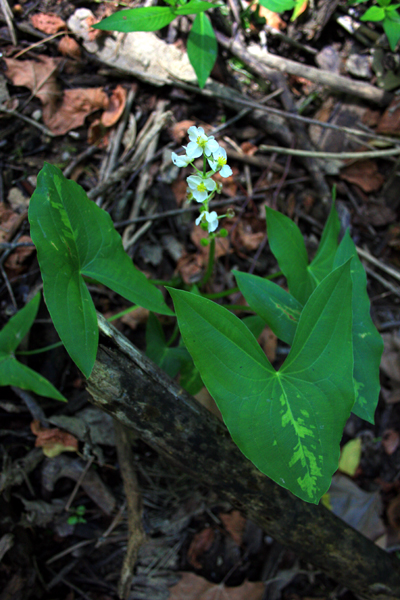
Common Arrowhead (Sagittaria latifolia),
September-blooming native Kentucky plant.
(*photo credit)
September 25, 2010 Is
Climate Change Out of Control?
When it comes to climate
change, I find myself like many others, vacillating between an apocalyptic
feeling and a pretended optimism, saying "Yes, we can!" The overall goal of
The Copenhagen Accord (signed by at least 124 nations) is to keep climate
change below an additional 2 degrees Celsius (C) by 2020 with a 1.5 degree C
goal for 2015. Climatologists at the Potsdam Institute for Climate Impact
Research find that nation-by-nation commitments to be meager or even
insufficient to meet any reasonable cumulative results (Nature, 464,
pp. 1126-28 [2010]).
The U.S. goals are barely above 1990 levels but the nation will most likely
increase carbon dioxide emissions well into 2011; European Union goals for 2020
mean less reduction than has occurred in the past two decades; China has a
business-as-usual attitude with its one additional coal-burning powerplant going
on line each week; India is little better with its own rush to "development."
With the exploiting of Western Canadian tar sands, that country will most
assuredly miss its target. The scientists find that only two affluent countries
(Japan and Norway) are meeting reductions of carbon dioxide levels of
one-quarter or more from 1990 levels.
If
all nations meet their respective goals there will be only a 15% drop from 1990
levels -- but even this is somewhat optimistic. Some countries intend to sell
surplus emissions or feel exempt from taking these goals seriously. Even an
optimistic estimate goes beyond a 2 degree C rise. If any emotion among these
expert objective scientists can be expressed, it is what "Acid News" in its
June, 2010, issue (pp.10-11) terms ALARMING. The scientists think there is a
50% chance the warming will exceed 3 degrees C by 2100. Some scenarios show a 4
or even an astronomical 5 degree increase -- a total global disaster scene.
The
corporate purveyors of doubt will tout misleading information such as the now
debunked "climategate scam" of November, 2009; and they always have an
audience. A public that does not want to change its ways prefers to doubt valid
scientific information (much like the 1960s cigarette controversies). However,
a good spirituality is seeing conditions exactly as they are. To answer the
original question, the climate change situation, caused by human beings, is not
beyond human control. However, a materialistic fumbling about with political
posturing and economic business-as-usual could lead to ruin for this fragile
planet. The alarm is not in what will happen in the year 2100, but what COULD
happen if we do not put our house in order. Who wants to be floating over what
had been Florida or New York City or even Bangladesh? Who wants to contend with
the roaming millions of hungry displaced people? Who wants 4 degree C warming?
Prayer:
Lord teach us to confront the "merchants of doubt" and to tell it as it is.
May any alarm be surrounded by a firm faith and expressed through an encouraging
hope for the better.
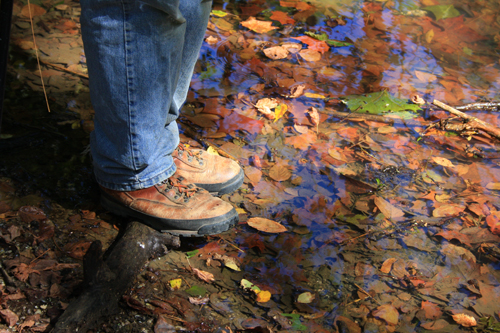
Autumn leaves, gathering in a pool of water.
(*photo credit)
September 26, 2010
Lazarus and the Wages of Affluence
Only in Luke's Gospel do we
hear about the rich man and Lazarus (Luke 16: 19-31). It is a vivid tale that
causes us to cringe and feel uneasy -- and isn't that what it is supposed to
do? We need to confront our comfort zones and ask whether we are more on the
side of the rich man than on that of the destitute Lazarus. We are haunted by
the fact that the rich man sees Lazarus, but he really does not see him as a
person in need. He contentedly passes him by. Do we do the same, for soon we
are to face Jesus?
The
story of Lazarus is meant for us, not just as individuals but for us as
Americans who have a wealth of resources -- and with beggars (e.g., Haitians) at
our door. Does this story say something about each of us as a member in a
democratic society required to be responsible for the resources that we have
gained, secured, extracted, processed and used in any way we wish?
Lazarus, the only named
person in the parables, challenges us down through the ages. We are in a rich
land, and poor little Haiti is at our door step. Furthermore, with television
bringing scenes to our homes, still one billion hungry people are at an
ever-widening doorstep. These hungry folks would be willing to consume the
massive amounts of food wasted in America or the pet food used by our animals
for that matter. One billion go to bed hungry tonight, and that is a form of
terrorism that we overlook.
The
risen Christ tells us how to live and why we must be sensitive to the needs of
our fellow human beings. The affluent can easily fall into becoming insensitive
to others in need, and thus associated with the rich man's brothers in the
parable. Are we as audience to lost souls calling for some dramatic shaking of
our collective affluent boots? If we pay attention we find that the parable
tells another dramatic story -- that the message of salvation has already been
told, and that many are insensitive now.
Some may contest coupling
affluence with the term "sinful." But affluence can dull us to the needs of
others and make us insensitive to their plight while we focus on further wanted
items. Jesus will confront us with this at our judgment. The failure to see or
experience the needy in our midst is the heart of the Lazarus parable and this
strikes us deeply as people who have excesses beyond the reckoning of past
generations. It is not a sin of commission, but one of omission. How
can we shake people addicted to consumer goods to cause them to change to a
simpler ways? What must be experienced while there is time to do something?
Maybe the more challenging question is -- what will move us to see before it is
too late? Why do terrorists hate American practices so much? Is it because
they covet the things we have, or do they fear the power to influence their own
people?
Prayer: Oh, gentle
Bonder of the Universe, bring our family closer together and cement our growing
togetherness with your kindly love. Teach us to see the needy and share from
our bounty.
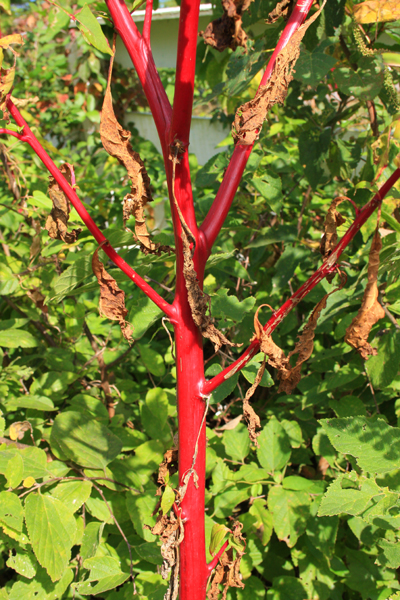
Bright red stalk of the poke plant.
(*photo credit)
September 27, 2010 Family
Day: Greener Ways Together
This
is Family Day. Three years ago (see
September 24, 2007) the togetherness theme involved joint family activities
(struggle, pray, work, grieve and being together) and all the suggestions still
hold. However, here we address a family's collective environmental awareness.
The following suggestions may help:
*
Plant Trees Together: Some will call this hackneyed for it has been said
many times. The best thing about tree planting is that many can participate and
say later that they planted this tree that will most likely outlive many family
members. One or two dig; one can set the plant; one can fill in the hole, and
one can water the sapling once planted. All can appreciate that this tree
(provided it can grow well) is for a future generation. Youth will remember
that tree planting is their investment in the future.
*
Create a Landscape Together: Consider those yard plants that are edible
by humans and animals. Let the landscape plan be a family affair, since some
prefer certain berries, others small bushes or vegetable or herb beds, and
still others flowers. Variety is key to a beautiful landscape. Intermix
vegetables with flowers for all the seasons; I use violets, lilies, marigolds,
begonias and cosmos (the last three blooming until frost). Work together.
*
Conserve Together: Could this be fun-and-games with some members getting
gold stars for being resource-conscious and others bad marks for forgetfulness?
Once a year consider any new saving techniques such as adding energy-efficient
light bulbs. Rather than monitoring individual water use patterns, think in
positive ways of conserving this resource within and around the home.
*
Recycle Together: What more can be said about recycling? A central
collection place with areas for different types of items may be established so
the practice will become second nature.
*
Plan Heating/Cooling Together: This green family activity can make a big
difference in energy bills. Some members, in contrast to others, tolerate
warmer temperatures indoors in summer or cooler space in winter. Every
temperature degree up or down makes an immense difference in bills. Some homes
with shaded areas (my own is in this category) require no air conditioning; even
so, some late afternoons on 90-plus days can become a little uncomfortable. Two
approaches may be considered: one is to modularize the residence with room air
conditioners installed for those needing cooler temperatures; another is to
decide on an average comfortable temperature and permit five degrees higher in
summer and five degrees lower in winter. Encourage more or less clothing as
some see need. Never let heating and cooling occur simultaneously. Reevaluate
practices for more energy savings.
Prayer:
Lord, help us to be environmentally-conscious in a good-natured way, so that we
find a way to be good to nature.

Spider finds resting place on rose.
(*photo credit)
September 28, 2010
Autumn Camping: Twelve Suggestions
Autumn
camping is as much a possibility as tenting in spring or summer -- and falls can
be mosquito- and tick-free. Autumn is neither too cold nor too hot; it is not
as buggy as summer nor ever as icy as winter; nor is the area overrun by
disturbers of the peace -- except for a few stray hunters. In fact, when the
Indian Summer is right, this place is ideal and yet missed by normal
vacationers. My suggestions may help make this quality time:
1.
Dress and bed down warmly for nights and early morning camping, for it is
turning cooler and frosty;
2.
Colors are coming on full so bring the camera or painting gear, and just accept
the color as a passing glory;
3.
Days are getting shorter, so time your sleeping so that the early morning
sunrise is welcomed in all its autumn splendor;
4.
Observe the wildlife, for everything from departing birds, spiders with
extensive webs, and scurrying squirrels seems to be doing the equivalent of
cutting firewood for winter;
5.
Take along the insect repellant, for you may encounter the lingering
yellowjacket or other disturbing creatures;
6.
Make an extra effort in choosing a good tent site. With fewer people the
choices may improve. Ideally the land should be well-drained, airy, quite
scenic, fairly quiet, somewhat protected, and pollution-free. No site is
perfect but a little more searching before bedding down will improve matters;
7.
Discern whether access by auto is a good thing. When one can pack materials
easily, the distance may prove a welcome separation, for we are all too immersed
in modernity;
8.
This is generally "fire season," so consider ways of avoiding the campfire and
yet all obtaining the same effects. One possibility is the camp light that
allows evening chatting around a circle, and yet no combustion that would add to
the pollution load occurs;
9.
Take along a pen and notebook. Now is the time of year when the reflections you
always wanted to write can be recorded;
10.
Take along some fruit of the season (apples, late peaches, early pears, papaws,
early fallen persimmons);
11.
Be careful about water quality and quantity; and
12.
Leave the cell phone at home or at least in the auto. A good suggestion for the
overly connected!
Prayer:
Lord, help us find time to enjoy the autumn scene.
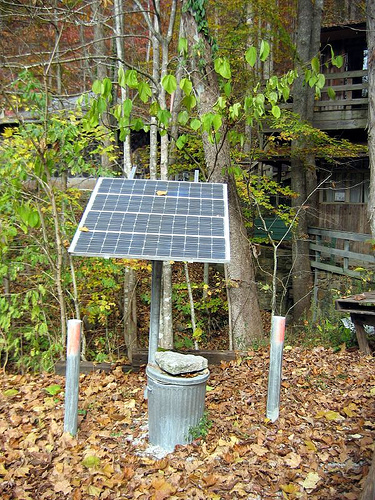
Solar panels at the Mary E. Fritsch Nature Center, ASPI.
(*photo credit)
September 29, 2010 Mary E.
Fritsch: Centennial of Birth
Homily at the Mary E.
Fritsch Funeral, November 12, 2005
Jesus brings all things to
perfection, and what he lists on the Mount of the Beatitudes is a new
revelation, a new way of living. Blessings go beyond wealth and power and fame;
they are more closely associated with being poor and meek and humble. When we
look closely, we find that Jesus lives in the fullness of each of these
beatitudes, for he is poor in spirit, meek, merciful and all the other
attributes wrapped up into one. Jesus is God's perfect blessing to each of us.
And furthermore we are encouraged to reach out and pass on this personal
blessing to others. We, as members of the Body of Christ, become an embodiment
of the beatitudes in the way we act -- and some succeed in doing this in a
variety of ways:
1 The poor in spirit
empty their larders for others -- their precious time is sacrificed in order to
listen to others; their moments of rest are spent attending to another starving
for attention; their expertise is shared with those wanting to know; their own
precious memories are recorded on audiotape and in written records; they give
from the depth of their hearts to relatives and friends; they do not hesitate
to donate generously, and always find more to give. They even manifest sheer
joy in bestowing keepsakes at the end of an active life to those who hunger for
some form of remembrance; they willingly surrender their car keys when unable to
drive safely at past speeds; and they sincerely say "thank you" to the ones who
take them to a nursing home, and again offer gratitude to their final
caregivers.
2 Mourners include
those who outlive their loved ones: parents, spouses, brothers and sisters, even
much younger ones; in-laws, a multitude of first cousins, and then the most dear
of friends. As each passes on, mourners must see them go with a tear and a
smile and bid them "good bye"; with time, the older mourners of the world feel
the utter loneliness of being left behind. Such is life -- but they will be
comforted.
3 The meek and lowly
come in all stripes and do not put on airs; they see other people as equal or,
better yet, as better then themselves. Their meekness extends beyond the human
community to the animal and plant world; the meek show compassion when a bird
falls from a nest or a flower struggles for lack of moisture. The meek have
green thumbs and can willingly tend a rose garden, a host of indoor plants, a
half-acre vegetable garden, plus a strawberry patch, fruit trees and lawn -- and
all the time regard the effort it takes as a privilege. The meek can take a
potted flower at random and show it humbly, and still return with a blue
ribbon. The meek will not dwell on accolades, but think about the next thing to
do.
4 Those who hunger for
justice are compassionate towards the hungry; so they bake and cook for
them, with a sense of joy no matter how hot the kitchen or long the day. They
can make the world's last hickory nut cake -- for it takes all November to pick
nut meats from the shells. And they divide the cake justly, so all can have a
proper portion. They make an extra batch of Christmas plum puddings and mock
mincemeat pies -- for all who hunger for good food and exquisite tastes and
smells. And they help establish justice through the kitchen oven and the sauce
pan.
5 Merciful people
seek God's mercy through reconciliation and then extend the divine mercy just
experienced to others, never judging, never condemning, never raising objections
to their conduct, always, always forgiving. The merciful can say five decades
of the rosary during more than eight decades of life and say "at the hour of our
death" over one and a half million times -- and still feel the need for loving
mercy -- which most certainly comes to them at that final hour. Many times they
remember the needs of others and beg God to grant a request, a cure, a higher
quality of life. And they are never surprised when miracles occur.
6 The heart-filled
ones rise early and retire late; they are people of immense energy, intuiting
another's need, doing large amounts of work, but always for others. They think
ahead and fill the cellar with canned goods, milk cows even on the evening
before a child is born; they strip tobacco in winter, weed plant beds in
spring, pull plants and set them in June, raise a batch of chickens, sell eggs
to the hatchery, make pickles and change the brine on schedule, shuck corn in
autumn, build wood fires with speed and efficiency, and cook immense meals for
threshers, Thanksgiving guests, and a growing family. And they do it all with a
pure heart.
7 Peacemakers never
glory in strife, never show favorites, never overlook the forgotten and little
ones. Peacemakers do not take sides, even when the family is split on certain
matters. If someone is talked about, peacemakers abstain from the
conversation. Peacemakers never complain about a bad card partner but, if and
when they are experts, will reveal defects in the partner's play.
8 Finally, blessed are
those who are willing to be the butt of jokes and to laugh with the others
and never reciprocate, who don't catch a punch line and yet never ask for a
repeat, who accept the menial things to do when others relax, and who love all
even those who do not treat them perfectly, and never complain about a
disability even when it immobilizes them for years.
Yes, most of us would strive
in our journey of Faith to focus on being with Jesus and to do just one of the
beatitudes well. Astoundingly, Mama Fritsch didn't try to focus on one or
other, but came close through the examples just given to doing all things in a
blessed way. She lived the beatitudes and became a true blessing for all of us
who were privileged to know and to be close to her. And we, in our fumbling
ways, should strive to be a blessing to other people as well. Then, and only
then, will the beatitudes take on a more divine and human face.

Complex patterns on assassin bug (family Reduviidae).
(*photo credit)
September 30, 2010
Poem: Times Are Changing
Events
always make us aware that time does not stand still but every moment is
different from all past or future ones. No one recalls even a fraction of those
moments of our lives. We certainly do not remember our birth and first few
years. However, much of who we are is marked by occurrences during those early
moments of life. The year 1933 stands out for me as my entry year. On an
autumn day Dr. Pollock, our family physician, held up the folding money that
Daddy gave him for my successful delivery. In that Depression period the good
doctor admitted it was the first folding money he had seen that month, and it
was the last day of September; before, there had been only chickens and eggs.
I
would like to admit to being happy with my years and announce the number when
asked. The average American male born this year is expected to live to be 75,
and my age has just exceeded that by two years. Thus each passing day is a
double gift, first life itself that is God's great blessing to us, and then the
added time to repair some of the damage done to our troubled world by me and
others. Each misdeed has done damage to the social order. Our awareness of
past and current wrongdoing makes us anxious to help fill up what is wanting in
the sufferings of the Lord for his body the Church -- and the added time is when
we encourage others to good deeds as well.
Times are Changing
Labor Day and all's quiet
after summer play,
Blooming ironweed,
goldenrod in colored array;
Good smells at garden
harvest time,
farmers' markets at
their prime;
First autumn chill,
longer cool nights,
foggy valleys, misty
lakes, cloudy heights;
Flocking birds in the
evening breeze,
seeming to overwhelm
the roosting trees.
Tomatoes get that late
season taste,
and peppers appear as
though post-haste;
Elderberries are not
eaten raw, but why?
They're destined for
a steaming pie.
Root cellars with
butternut and winter squash,
and all sorts of
apples, not just McIntosh.
Prepare the greenhouse
for the frosty fall,
we all know well the
autumn call.
Prayer:
Lord, help us see each day as your gift to us, knowing that we are deserving of
none and yet thankful for all. Make our todays better than our yesterdays and
our tomorrows better than our todays.
|